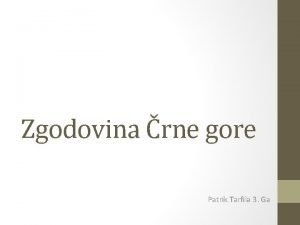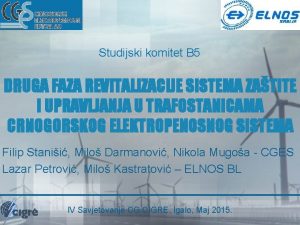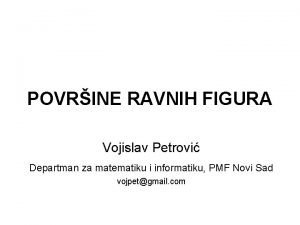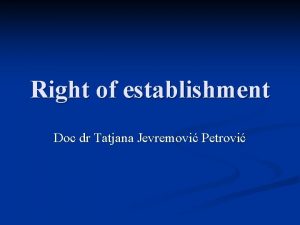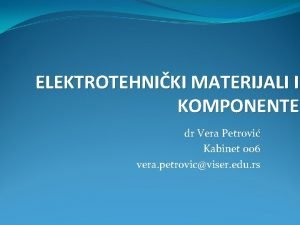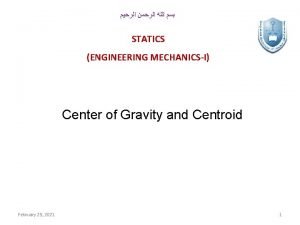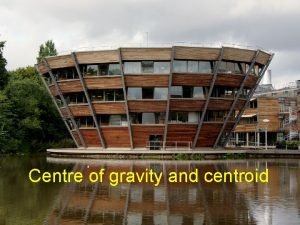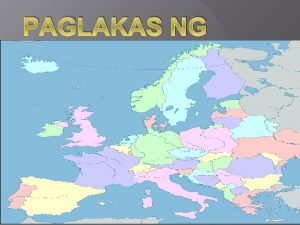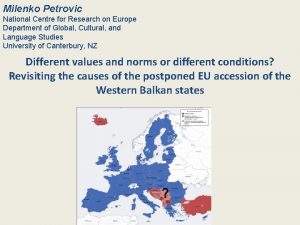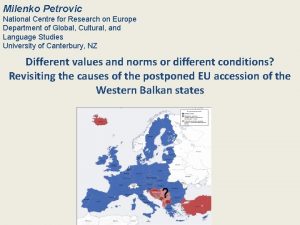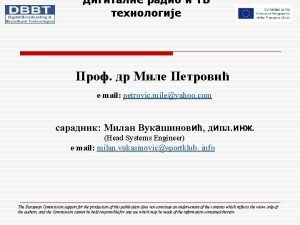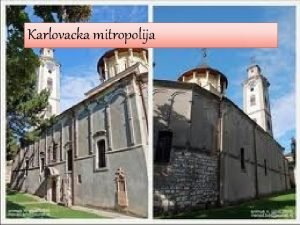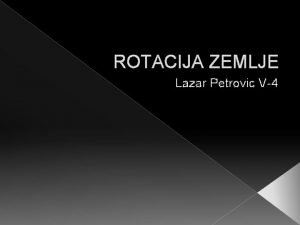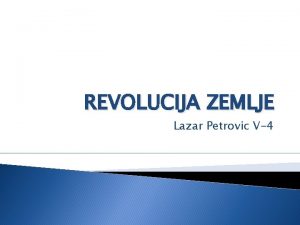Milenko Petrovic National Centre for Research on Europe









- Slides: 9

Milenko Petrovic National Centre for Research on Europe University of Canterbury Christchurch, NZ Peace without state building: assessing the results of the EU's peace and statehoodbuilding efforts in the Western Balkans ?

Peace without state building: assessing the results of the EU's peace and statehood-building efforts in the Western Balkans 1. The EU and the post-communist Balkans in the 1990 s 2. The establishment and purpose of EU missions in the Western Balkans 3. The results of 20 years of EU (and International) state building efforts in the WB 4. Why did it not work in the Western Balkans?

1. The EU and the post-communist Balkans in the 1990 s 1. 1. A slow start but similar EU approach to all European post -communist states after 1989 • PHARE, Association Agreements (AA) and ‘Aid Package’ for Yugoslavia during 1990 -91, but different responses from Central Europe and the Balkans • Victory of ex-communists (or national populists in Cro and B&H) in all SEE states – no real reforms; problematic relations with the West and the EU - lack of foreign technical/administrative and financial assistance for reforms; civil wars in Croatia and Bosnia and Herzegovina – the relevance of timing 1. 2. Only after the end of the post-Yugoslav wars did the EU offer a “coherent strategy” for the Western Balkans (1997) • Conditionality (the return of refugees, respect for the Dayton Agreement and cooperation with the ICTY) and graduality (in providing assistance) for regional peace, stability and progress in democratic and market reforms (EUGA Council, April 1997; EU Commission, May 1999; Pippan, 2004) • Stabilisation and Association Process (SAP) in 1999 and strong support for the establishment of UN peace-keeping and monitoring missions in B&H and Kosovo

2. The establishment and purpose of EU missions in the Western Balkans 1. Established in the early 2000 s as a substantial replacement for the (formally still existing) UN civil and military peace-keeping and monitoring missions in B&H and Kosovo The ‘original’ mission(s) aimed to monitor and mentor the implementation of the 2001 Ohrid Agreement on the peaceful resolution to the ethnic conflict in Macedonia. 2. The basic aim of all missions: to secure peaceful development, the rule of law and assist these countries ‘to make further progress towards European integration in the context of the Stabilisation and Association Process’ (EUEA website, June 2012) 3. BOSNIA AND HERZEGOVINA • The Office of the High Representative (OHR , 1995 - present) established by the UNSC (but all High Representatives were from EU countries and the EU is the main donor) ‘[to] oversee implementation of civilian aspects of the Peace Agreement ending the war in B&H’ and ‘to ensure that B&H evolves into a peaceful and viable democracy on course for integration in Euro-Atlantic institutions’ (OHR website) • The European Union Police Mission (EUPM, 2003 -2012) to ‘strengthen… the rule of law in Bosnia and Herzegovina’ and to ‘create, under B&H ownership, a modern, sustainable, professional multi-ethnic police force, trained, equipped and able to assume full responsibility and to independently uphold law enforcement at the level of international standards’ (EUEA, June 2012) • The EUFOR ALTHEA military operation (B&H, 2004 – present) to provide capacity-building and training support for the Armed Forces of Bosnia and Herzegovina while retaining the capacity to intervene to support B&H efforts in maintaining the safe and secure environment (EUEA, June 2015)

2. The establishment and purpose of EU missions in the Western Balkans (cont: Macedonia and Kosovo) 4. KOSOVO The European Union Rule of Law Mission (EULEX, 2008 – present) to ‘provide support to Kosovo’s rule of law institutions at the strategic level’ through its ”Monitoring, Mentoring and Advising (MMA) objective” (‘assistance to the senior management of the Kosovo Judicial Council, Kosovo Prosecutorial Council, Kosovo Police etc. ’) and through its “Executive” objective” by doing its own ‘investigations, prosecutions, and adjudications of war crimes, terrorism, organised crime, corruption and other serious crimes’ (EULEX, June 2015) 5. FYR MACEDONIA CONCORDIA and EUPOL PROXIMA police missions (2003 -2005) for ‘monitoring, mentoring and advising the country's police thus helping to fight organised crime as well as promoting European policing standards” (EUEA, June 2015) 6. The important roles of the EU Special Representative in Kosovo and the head of the EU delegation in Macedonia

3. The results of 20 years of EU state building efforts in the WB • • • Bosnia and Herzegovina ‘remains at a standstill in the European integration process. There remains a lack of collective political will on the part of the political leaders to address the reforms necessary for progress on the EU path. There has been very limited progress on political and economic issues and on moving towards European standards’ (European Commission, October 2014*). Despite the recently completed negotiations of a SA agreement with the EU, ‘the rule of law in Kosovo, including judicial independence, and limited results in the fight against organised crime and corruption remains a major concern…Kosovo made limited progress on its path to become a functioning market economy’ (European Commission, October 2014*). ‘The EU accession process for the former Yugoslav Republic of Macedonia is at an impasse. Failure to act on the Commission’s recommendation to the Council means that accession negotiations have still not been opened. At the same time, the government’s failure to deliver sufficiently on a number of key issues damaged the sustainability of reforms, with backsliding evident in some areas…[particularly regarding] the increasing politicization of state institutions and government control over media, including in the context of elections …[and] growing concerns about selective justice…’ (European Commission, October 2014*). *European Commission, “Enlargement Strategy and Main Challenges”, Communication from the Commission…COM(2014) 700 final, Brussels, 8. 10. 2014.

Table 1. Progress in Political and Economic Transition Democracy* Economic Transition** 1999 2006 2014 Hungary 1. 88 2. 00 2. 96 3. 7 4. 0 3. 9 Poland 1. 58 2. 14 2. 18 3. 5 3. 7 4. 0 Romania 3. 54 3. 39 3. 46 2. 8 3. 3 3. 7 Bulgaria 3. 58 2. 93 3. 25 2. 8 3. 5 3. 7 Croatia 4. 46 3. 71 3. 68 3. 0 3. 5 3. 8 Maced FYR 3. 83 3. 82 4. 00 2. 7 3. 1 3. 6 Serbia 5. 50 3. 79 3. 64 1. 4 2. 7 3. 2 Montenegro 5. 50 3. 89 3. 86 1. 6 2. 5 3. 3 Albania 4. 75 3. 79 4. 18 2. 6 2. 9 3. 5 Bosnia-Hrz 5. 42 4. 07 4. 43 2. 0 2. 6 3. 1 * Freedom House “Democracy score” (1 being the highest; 7 being the lowest) * * EBRD transition indicators (4. 33 = standards of advanced industrial economies; 1 = standards of a centrally planned economy)

Table 2. Progress in Stabilisation and Association Process Country SA Agreement Application for EU Membership Official Candidate Status Albania YES (12/06/2006, in force since 1/04/09) YES (28/04/2009) YES (27/06/2014) Bosnia-Herzeg. YES (16/06/2008; in force since 1/06/15) NO Croatia YES (9/04/2001, in force since 1/02/ 2005) YES (20/02/2003) YES (18/06/2004, acc. neg. Oct. 2005 to June 2011; EU member, 1/07/2013) Macedonia FYR YES (9/04/2001, in force since 1/04/2004) YES (22/03/ 2004) YES (16/12/2005)** Montenegro YES (15/10/2007, in force since 1/05/10) YES (15/12/2008) YES (17/12/2010, acc. neg. opened in June 2012) Serbia YES (29/04/2008)* YES (22/12/2009) NO YES (1/03/2012)** * frozen pending further Serbian cooperation with the ICTY from 29/04/2008 to 7/12/2009 ** accession negotiations are still waiting to be opened

3. Why did it not work in the Western Balkans? 3. 1. Contrasting visions of constitutional/statehood status by different ethnic/political groups continue to be the main source of political instability and obstacle for the consolidation of institutions of democracy in most (multi-national) WB states; they desperately need international assistance, but 3. 2. Decreased motivation for new enlargements and enlargement fatigue in the core Western members of the EU since 2005 and especially since 2007, have contributed to make conditions for accession tougher (by June 2011 Croatia and Turkey had more accession negotiations talks with the EU than any accessory state of the 2004/2007 enlargement) and have lessened interest in deeper analytical work in preparing the (right) policy incentives 3. 3. The EU (i. e. its most powerful member states) was not able to offer a coordinated and comprehensive EU approach towards the challenges to statehood status in the Western Balkan states which would be based on undisputed/universal standards and norms (such as democracy, the rule of law and respect for human rights), but 3. 3. Different proposed solutions for basically the same problem of contesting the current (or proposed) statehood/constitutional status of a particular state by the dominant majority of an ethnic group which makes up a significant portion of the population of that state: - centralisation for B&H - decentralisation/dissolution for Macedonia, (the former) Serbia and Montenegro, and Serbia (with Kosovo) - the ‘partial’ EU recognition of Kosovo independence as a ‘sui generis’ case was particularly controversial because of both its damaging effects on the realisation of Serbia’s (and Kosovo’s) EU membership ambitions* and the mixed signals send to the neighbouring Western Balkan states, particularly B&H and Macedonia * Progress “in the Belgrade-Pristina dialogue” is currently more important than meeting the original
